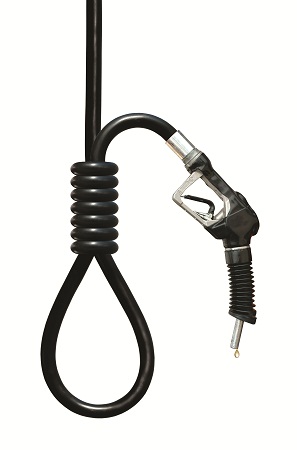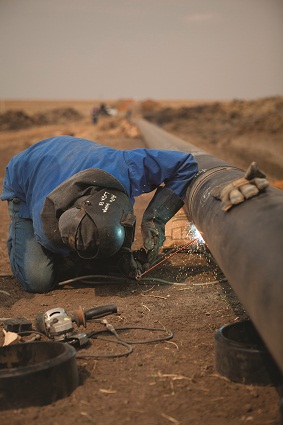
 Although gas prices may have reached their peak, at an average of $3.92 a gallon, the impacts of high gas prices continue to ripple throughout the U.S. economy and impede our fledgling economic recovery. For manufacturers—who use one third of all energy consumed in the United States—rising gas prices can be particularly devastating. Higher transportation costs throughout the supply chain significantly increase the costs of moving raw materials and getting goods to market. These additional costs hamper manufacturers’ ability to make new investments, expand and create jobs.
Although gas prices may have reached their peak, at an average of $3.92 a gallon, the impacts of high gas prices continue to ripple throughout the U.S. economy and impede our fledgling economic recovery. For manufacturers—who use one third of all energy consumed in the United States—rising gas prices can be particularly devastating. Higher transportation costs throughout the supply chain significantly increase the costs of moving raw materials and getting goods to market. These additional costs hamper manufacturers’ ability to make new investments, expand and create jobs.
While the recent stabilization in gas price increases—driven by declining crude oil and wholesale gas prices and lower consumer demand—is positive, gas prices are still dangerously high. An April forecast by the Energy Information Administration predicted that gas prices will average $3.95 a gallon through September. This forecast was based on an average cost of $106 a barrel, which is up $11 a barrel from last year.
It is time for Washington to get serious about increasing oil production in this country. A meaningful “all of the above” energy policy must include all available sources of oil, both domestically and from our North American allies. This means expanded exploration of the Outer Continental Shelf (OCS), additional development of shale oil and the approval of the Keystone XL pipeline. As we become less reliant on oil from the Middle East, we can reduce the impact of the region’s volatility on our markets.
 Currently, less than three percent of the OCS is under lease, yet we get more than 20 percent of our oil from the OCS. There are vast reserves offshore, and it is critical to utilize those reserves if we hope to gain energy independence. The recent five-year leasing plan for the OCS was very disappointing and indicated that President Obama is not committed to utilizing all of our resources. We need to open new areas for oil and gas production in the Gulf, Alaska and on both coasts. Not only will these leases provide additional oil, they will also create thousands of new jobs—and the ripple effect will be felt throughout the country.
Currently, less than three percent of the OCS is under lease, yet we get more than 20 percent of our oil from the OCS. There are vast reserves offshore, and it is critical to utilize those reserves if we hope to gain energy independence. The recent five-year leasing plan for the OCS was very disappointing and indicated that President Obama is not committed to utilizing all of our resources. We need to open new areas for oil and gas production in the Gulf, Alaska and on both coasts. Not only will these leases provide additional oil, they will also create thousands of new jobs—and the ripple effect will be felt throughout the country.
President Obama and his Administration have offered various proposals they claim will enhance our energy security, but they continue to miss the mark. The President passed up a tremendous opportunity to increase our energy security when he rejected the entire Keystone XL pipeline earlier this year.
“It is positive news that the Administration will now expedite permits for a small section of the pipeline. But the real need is for swift approval of the full Keystone XL pipeline, providing us access to an affordable and reliable source of energy while creating thousands of jobs immediately,” said National Association of Manufacturers (NAM) President and CEO Jay Timmons.
The Keystone XL pipeline is a $7 billion expansion project to connect Canadian crude oil, both from traditional deposits and oil sands, with refining centers on the Gulf Coast of the United States. The pipeline would immediately create more than 20,000 high-wage U.S. manufacturing and construction jobs, as well as some $20 billion in investment and 118,000 jobs in the long run. In late August 2011, the U.S. State Department released its final environmental impact statement, concluding that the proposed pipeline would have limited adverse environmental impacts.
 In addition to approval of the entire Keystone XL pipeline, we must foster the full-scale development of shale oil resources so that we can begin to reap the widespread benefits of this plentiful alternative energy source without erecting unnecessary regulatory impediments. Nationally known shale oil reserves in the western United States (in Texas, Colorado, Utah and Wyoming) have the potential to provide significant oil production.
In addition to approval of the entire Keystone XL pipeline, we must foster the full-scale development of shale oil resources so that we can begin to reap the widespread benefits of this plentiful alternative energy source without erecting unnecessary regulatory impediments. Nationally known shale oil reserves in the western United States (in Texas, Colorado, Utah and Wyoming) have the potential to provide significant oil production.
Efforts to expand access to the OCS and shale oil formations, approve the full Keystone XL pipeline and reduce overly burdensome regulations that drive up fuel costs continue in Congress. In March, House Republicans unveiled the American Energy Initiative, a plan to help lower gas prices that includes expanding domestic exploration and drilling, expediting permitting for energy production on federal lands and analyzing the economic impact of various federal regulations aimed at the refining sector.
Republican leaders also outlined plans to push for a more streamlined permitting process to encourage the construction of new deepwater drilling projects that were halted after the BP oil spill.
“At a time when our economy is already in a position when it is not creating enough jobs, rising gas prices hurt the very people that we need to lead us out of our economic crisis, and that’s small businesses,” said House Speaker John Boehner (R-OH) at a press conference to announce the initiative on March 10.
 The NAM supports all of these measures and is creating opportunities for its members to voice their support for an “all of the above” energy strategy to lower gas prices and improve our energy security.
The NAM supports all of these measures and is creating opportunities for its members to voice their support for an “all of the above” energy strategy to lower gas prices and improve our energy security.
While many global market forces determine the cost of gasoline, the failure of the United States to develop and fully utilize all of its oil resources has left manufacturers and consumers subject to sometimes wildly fluctuating gasoline prices that damage our economy and our ability to compete globally.
We are long overdue in starting down the path toward energy independence and self-reliance. We may never have the ability to determine the price of a barrel of oil, but one day we could be in a position where we are producing more oil domestically and we will not have to worry about where our oil is coming from.
At this critical time in our economic recovery, we cannot afford to take options off the table when it comes to affordable energy. We need expanded domestic production, both on and offshore, and a plan to work with our North American allies on developing additional resources and approving the Keystone XL pipeline.
The NAM continues to urge Congress to take serious steps in moving forward with policies to lower energy costs, bolster manufacturing competitiveness and create good, high-paying jobs in
America.

